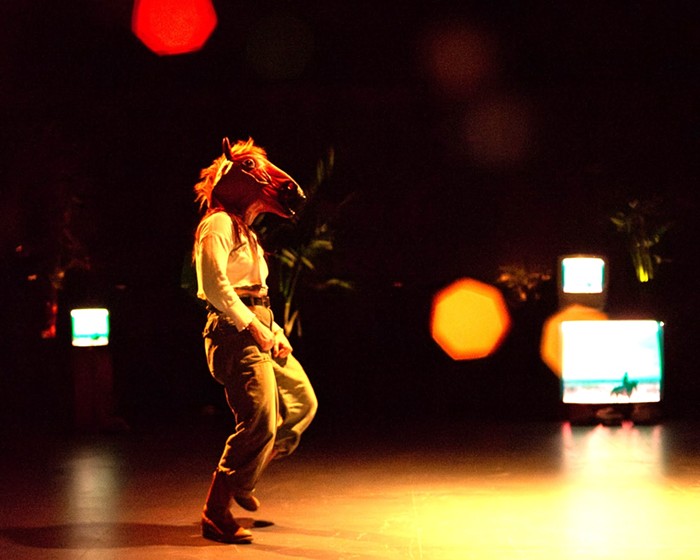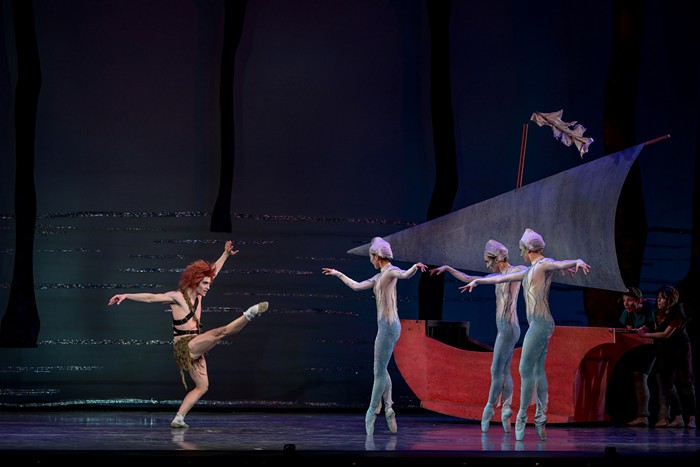Portland Center Stage, 1111 SW Broadway, 274-6588, Fri-Sat 8 pm, Sat-Sun 2 pm, Sun 7 pm, closes this weekend, $15-55
One of the hot shits in the theater world right now is playwright Nilo Cruz, a prize-winning Cuban-American whose works are getting produced all over the world. In the Pacific Northwest alone, there have been three major Cruz productions this season, including the Miracle Theater's Lorca in a Green Dress in October, and Portland Center Stage's current run of Anna in the Tropics, which won the Pulitzer Prize for drama last year. Cruz's characters live in a nostalgic dream world, speaking not like real people talk, but how Cruz wishes people talked, each person capable of spinning lucid webs of lilting language. A romantic, Cruz dwells in love triangles and historical drama that if not for his knowledge of literary craft, would befit the paperback aisles in grocery stores. It would be too strong to describe Cruz's plays as "bad," but they are most certainly overrated. They're well written, fluid, and at times downright eloquent, but these attributes frequently feel like trimmings, on stories that aren't nearly as meaty as their trusses make them appear.
To be fair, Cruz has been magnified beneath the lens of intense hype. Though he's certainly not shunning his success, interviews and the work itself reveal a fairly mellow dude who never set out to make modern dramatic explosions like, say, Suzan-Lori Parks, or Charles Mee. The man likes Lorca, and he likes small tales of love and loss amidst Hispanic culture. Attach a label like Pulitzer to a play like Anna in the Tropics, and Epic Expectations are imminent, but Tropics, despite its murderous finale, skips across its tragic tale with such lyrical lightness, it hardly seems to be there at all.
Set in the steamy confines of a Cuban cigar factory outside of Tampa, 1929, Tropics recalls a time when technology was a lesser beast, and joys like fine cigars were lovingly rolled by actual human beings. It was a tradition in cigar factories at that time to hire lectors that would come and read stories to the workers as they rolled. The lector who arrives in Tropics, Juan Julian (Pedro Pascal), is a dashing chap who sends the ladies swooning and makes their husbands fuming mad. While doing daily readings of Tolstoy's Anna Karenina, Julian sets his sights on Conchita (Marlene Forte), a repressed beauty who isn't getting what she needs from her loutish husband Palomo (Bruno Irizarry). Meanwhile, the factory's co-owners, brothers Santiago (José Ramón Rosario) and Cheché (José Febus), have problems of their own. Santiago's charming, but can't control his liquor, and Cheché's a troubled scrooge who wants to replace workers with machines, and who struggles to hide his leftover angst from when his wife walked out on him.
Cruz etches these fairly domestic dilemmas with lighthearted whimsy, then down the stretch pulls a tragic finale so heavy it hurts, though not in a particularly good way. It's not that Cruz fails to justify his ends with means; he just treats everything with such stripped down poeticism, it all goes by in a blur. The themes are weighty, but the style virtually floats, and yet Portland Center Stage--as they are prone to do--treats this production as if it's the end-all, be-all. Did you fail to recognize any of those aforementioned cast members? That's because not one is local--the entire cast are ringers from NYC and beyond. Even director Timothy Douglas has been shipped in from Louisville, and the production values are topnotch. The cigar factory is cavernous, lit beautifully and naturally by Peter Maradudin, but the action all takes place around one little table, even the sex scenes. Douglas doesn't know what to do with the huge space, and arranges his actors in two-dimensional lines.
Pulitzer or no, Cruz doesn't belong here; his plays are soft and intimate, not vast and loud. The performers belt their lines out, in accents that come and go like the wind. Only the veteran TV/film actor Rosario as the elder honcho Santiago comes through in the clutch. This white-haired old guru imbues his role with both sadness and strength, and is the only cast member worth the money PCS must have paid to bring everyone out, put them up, and pay them for months of work. Many resources have been spent on puffing air into Anna in the Tropics, and that's troubling. But what's worse is that Tropics is so clearly a play that was never meant to have air puffed into it in the first place. That's just embarrassing.


















